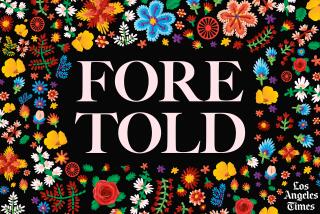THE BIG MIX : Pop Music : A Home for Folk Music: Greek, Balkan, Gypsy and More
- Share via
Fielding a phone request for Mongolian “throat” music . . . sending off a mail order of five cassette tapes of Gypsy music to a woman in Texas. . . .
It’s all in a day’s work for John Filcich, the owner of the Festival Foreign Records store in Los Angeles.
Festival Foreign Records is a far cry from a typical contemporary record store. The spacious, homey store near Pico Boulevard and Normandie Avenue is jammed with record bins full of traditional folk and folk dance records from around the world.
Festival specializes in Greek and Gypsy recordings as well as music from the Balkan nations.
Such albums as “Le Mystere Des Voixs Bulgares” and “The Gipsy Kings,” two recent left-field pop chart successes, are representative of the kind of music regularly available at the store.
“I had them before they were known,” said Filcich, 65, in a bemused tone. “I had the Chieftains before the Chieftains became popular and reggae music before you heard about reggae.
“I don’t know how many more things I’ve got here right now that people are going to be excited about 10 years from now. It just takes the right kind of exposure.”
Providing that exposure for international music has sustained Filcich through a career that began in the era of 78s, 40 years ago, and has now reached the CD age. Filcich’s dislike of pop and rock music means that he doesn’t stock many of the international pop records that are beginning to make inroads in the mainstream pop market, but he’s not surprised that pop fans are showing more interest.
“It certainly should be appreciated by everybody,” he contended. “The music has a long heritage and tradition and the most beautiful aspect of any foreign culture is the music and dance. It’s a universal language; you don’t have to understand it to be able to appreciate it.”
Filcich’s interest in international music was sparked after his father received an old phonograph and a stack of Bulgarian, Serbian and Macedonian records in exchange for painting a house. He gave the device to John, his eldest son, in 1935.
Filcich’s interest in music was further fueled by growing up in the polyglot city of Gary, Ind., a steel industry town packed with immigrants from Eastern Europe who performed the music and dances of their native lands at picnics and church bazaars.
Filcich opened the first branch of Festival Records in Oakland in 1949 and then expanded to a store in San Francisco. He opened the Los Angeles store 25 years ago across from St. Sophia’s Greek Orthodox Cathedral.
The Greek community is still the cornerstone of his business. An array of neatly marked cardboard boxes of cassettes and CDs lines the walls behind the register, and shelves around the store display religious icons, souvenirs and videos that Filcich stocks for his Greek Orthodox and Gypsy customers.
The store was devoid of casual browsers late one recent afternoon, but Filcich indicated that was par for the course. Most of his regular customers drive in from their homes in the outlying suburbs or, in the case of the Gypsies, stop in when their travels bring them to Los Angeles. Filcich often loads up a van with merchandise to sell at church events or folk dance workshops and also does a healthy mail order business with his Gypsy customers.
“I will always be able to say that I found the right niche in life in my work,” Filcich observed. “When I was young, I was either fired out of every job that I had or hated it so much that I wished they did fire me. Once I got into this, I couldn’t spend enough hours on it. I have enjoyed my business and enjoyed my life because of it.”
More to Read
The biggest entertainment stories
Get our big stories about Hollywood, film, television, music, arts, culture and more right in your inbox as soon as they publish.
You may occasionally receive promotional content from the Los Angeles Times.










